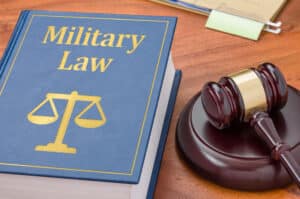What is a UCMJ Article 32 Hearing?
A UCMJ Article 32 hearing is a pretrial investigation in the military justice system. It is similar to a civilian grand jury proceeding. The Universal Court of Military Justice (UCMJ) is a set of laws and regulations that govern the conduct of members of the United States military.
The UCMJ establishes the legal framework for the military justice system and outlines the rights and responsibilities of military personnel, as well as the procedures for handling legal matters within the armed forces.
During the Article 32 hearing, evidence is presented, witnesses are called, and both the prosecution and defense can examine and cross-examine witnesses. The purpose is to determine if there is enough evidence to proceed to a court-martial.
Let’s take a closer look at what happens during a UCMJ Article 32 hearing, and how an experienced military defense lawyer can help.
Importance of the UCMJ Article 32 Hearing in the Military Justice System
The UCMJ Article 32 hearing holds significant importance in the military justice system for several reasons. The Uniform Code of Military Justice is like a rulebook for the military. It lays out the dos and don’ts for military personnel. The Article 32 hearing is part of this rulebook.

It’s a process defined by the UCMJ to carefully investigate serious allegations before deciding whether to go to a full trial.
- Fairness and Due Process: An Article 32 hearing intends to ensure that military personnel accused of offenses can present their case and challenge evidence against them. This upholds the principles of fairness and due process, fundamental to any justice system.
- Pretrial Investigation: The hearing serves as a thorough pretrial investigation, allowing for the gathering and examination of evidence before proceeding to a court-martial. This helps in determining if there is sufficient evidence to support the charges brought against you.
- Protection of Rights: Provides you with the right to be represented by legal counsel, call witnesses, and cross-examine those presented by the prosecution. This process safeguards your legal rights in accordance with the UCMJ.
- Decision-Making on Court-Martial: Aims to assist the convening authority in making an informed decision on whether to refer the case to a court-martial. Allows for a careful evaluation of the evidence, witnesses, and legal arguments before proceeding to a formal trial.
- Public Confidence: Enhances public confidence in the military justice system by demonstrating transparency and a commitment to a fair and thorough legal process. Contributes to maintaining discipline and morale within the military ranks.
- Balancing Interests: Strikes a balance between the interests of justice and the need for swift and efficient resolution of legal matters within the military context. Provides a mechanism to address allegations of misconduct while respecting your rights.
How an Article 32 Hearing Compares to Civilian Proceedings
In simple terms, the Article 32 hearing is a way to make sure things are fair and square before deciding to go to a trial. It’s like a careful check to see if there’s a good reason to move forward with more serious legal actions in the military.
The Article 32 hearing is like a “military version” of a grand jury in civilian court. Similar to how a grand jury investigates before a trial, the Article 32 hearing is a thorough look into the evidence before deciding whether to go to a formal trial (court-martial).
The main goal is to figure out if there’s a strong case to go to trial. Witnesses are called, evidence is presented, and both sides get to ask questions.
Rights of the Accused During the Article 32 Hearing
If someone in the military is accused of something serious, they have rights during the Article 32 hearing. You have the right to be represented by a lawyer, call witnesses, and question the evidence and witnesses brought by the other side. It’s a way to make sure you have a fair chance to tell your side of the story and challenge anything that might not be right.
The UCMJ sets the rules, and during the Article 32 hearing, you get a fair shot to defend yourself with the help of a lawyer and by questioning the evidence presented against you.
What is the Process for an Article 32 Hearing?
Presentation of Evidence
The prosecution (the side accusing someone) presents evidence to show why they think the accused did something wrong. Evidence can include documents, statements, or anything that helps tell the story of what supposedly happened.
Examination and Cross-Examination of Witnesses
Both the prosecution and defense (the accused’s side) get a turn to ask witnesses questions. The goal is to get a clear picture of what happened. The accused’s side wants to show there might be another side to the story or that the evidence isn’t as strong as it seems.
Role of Both Prosecution and Defense

The prosecution presents evidence and witnesses to make their case. The defense questions the evidence and witnesses to show there might be doubts or another perspective. A lawyer represents the accused during this process.
The military authorities, after the hearing, decide whether there’s enough evidence to go to a full trial (court-martial). They look at things like how strong the evidence is, if there are any doubts and if it’s fair to move forward.
If the investigation is thorough, it means all angles are considered, all evidence is examined, and both sides get a fair chance to present their case. This fairness is essential to make sure the outcome is just.
An experienced military defense attorney from Military Law is an advocate you need to represent you in an Article 32 hearing. We understand the serious implications of military justice proceedings on your life and career.
How Can a Military Defense Attorney Help Me in a UCMJ Article 32 Hearing?
An experienced military defense attorney can provide valuable assistance to a service member facing a UCMJ Article 32 hearing in several ways:
- Legal Experience: An experienced attorney understands the intricacies of military law and the UCMJ. They can provide expert guidance on the specific legal issues surrounding the case.
- Case Analysis: The defense attorney thoroughly reviews the evidence presented by the prosecution and assesses the strengths and weaknesses of the case. This analysis helps in building a robust defense strategy.
- Representation during the Hearing: Your defense attorney actively represents you during the Article 32 hearing. They can cross-examine witnesses, challenge evidence, and present arguments to support your case.
- Protection of Rights: Ensures that your rights are protected throughout the process. This includes the right to a fair hearing, the right to present a defense, and the right to legal counsel.
- Legal Advice and Counsel: Your attorney can present legal advice explaining the implications of the charges, potential outcomes, and the best course of action.
- Negotiation and Mitigation: A skilled defense lawyer engages in negotiations with the prosecution to explore the possibility of resolving the case without going to a court-martial. If a trial is unavoidable, the attorney works to mitigate potential consequences.
- Experience With Military Culture: Understanding the unique culture and structure of the military, a defense attorney with experience handling cases within the military justice system can navigate the specific challenges and dynamics involved in military legal proceedings.
- Appeals and Further Proceedings: In case of an unfavorable outcome at the Article 32 hearing, your attorney can advise on the next steps, including potential appeals or other legal actions.
A knowledgeable military defense attorney plays a crucial role in ensuring that you receive a fair and thorough defense during the UCMJ Article 32 hearing, protecting your rights, and advocating for the best possible outcome.
Take Control of Your Future – Contact Military Law Today

Jeremy Snyder, Military Criminal Defense Lawyer
If you are facing a UCMJ Article 32 hearing, it’s crucial to secure experienced legal representation to navigate this complex process. Military Law is here to provide dedicated and skilled defense for military personnel in these challenging situations.
Our team of seasoned military defense attorneys possesses a deep understanding of the UCMJ and is committed to protecting your rights and ensuring a fair and thorough defense.
Facing serious allegations within the military justice system requires a specialized approach, and our attorneys bring both experience and a compassionate understanding of the unique challenges that service members may encounter. We are ready to analyze your case, strategize a robust defense, and advocate for the best possible outcome during the Article 32 hearing.
Don’t face the complexities of a UCMJ Article 32 hearing alone. Contact Military Law today to schedule a consultation and take the first step toward securing the experienced legal representation you deserve.
Our team is dedicated to standing by your side, providing the support and advocacy needed during this critical phase of the legal process. Our military defense attorneys are prepared to travel to military courtrooms all over the world. We serve all active-duty service members in all U.S. military branches.
Call us at (800) 235-3645 or fill out our online contact form to reach out to our legal team.
